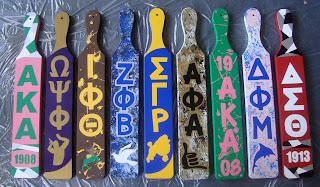Pi Kappa Phi (Sigma Chapter) - University of South Carolina
Fraternity and sorority houses range in size from three to twenty bedrooms or more. They can usually be identified by large Greek letters or flags on the front of the house. The larger houses generally have a large meeting room and/or dining room, commercial kitchen and study room. There is usually a lounge of some sort, access to which is often restricted to fully initiated members. Fraternities and sororities will also often maintain a chapter room, to which only initiates may ever be admitted and even whose existence may be kept secret. The walls of the house may be decorated with pictures of past chapter events, awards and trophies, decorative (or historic) paddles, or composite photos of members from past years.
Kappa Delta (Delta Omega Chapter) - Mississippi State University
In some fraternities or sororities, only the representatives live in the houses while in others the entire fraternity or sorority may live in the house. Other, larger fraternities or sororities may have more than one house to accommodate all of its members.
Pi Kappa Phi (Alpha Psi Chapter) - Indiana University
Most houses are paid for by the alumni or the national organization of that fraternity or sorority. In some cases, the host college might have paid for the house if it is located on campus. Different schools have different rules when it comes to the finances. Once you are allowed to have the option of moving into a fraternity or sorority, it is sometimes cheaper to live in a fraternity/sorority house while other schools are much more expensive.
Kappa Delta (Kappa Alpha Chapter) - Florida State University



















.jpg)


